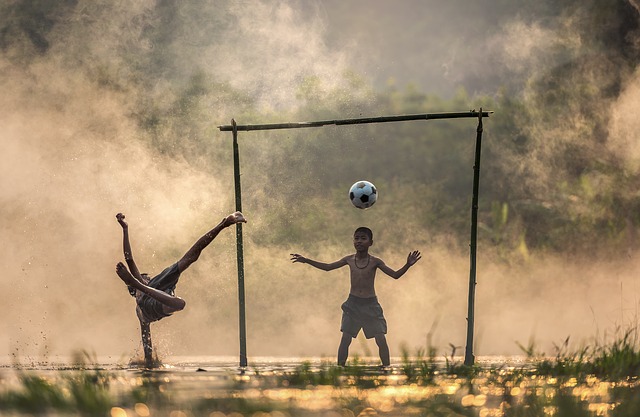February 5, 2018
Children and Sports: the Fallacy of Teamwork
Sports are considered very important for children’s development, and rightly so. Participating in such activities promotes healthy competition and a better understanding of one’s self. It also, supposedly, promotes teamwork. But there is a problem there, which I will refer to as the fallacy of teamwork: playing together and playing as a team are two very different aspects. Confusing them can lead to serious consequences in terms of parent-child relationship. It can also have negative consequences for a child’s development.
As I have mentioned before, experiencing is an integral part of being an author. You must see the world around you before you write. And so, I have learned to pay attention to seemingly unimportant events around me. Let me tell you two little stories that are related to today’s topic, the fallacy of teamwork.

The Fallacy of Teamwork: Two Example Cases
Case 1
As I was walking home one day, I passed by a school. I heard commotion, noises and yells, and stood to take a look. About 15 boys, around 10 years old, were playing football (soccer) during a recess. I followed the game for a while, and soon realized what was so interesting about it. Although they were playing a team sport, they weren’t acting as a team at all.
What happened, in each and every play, was this: as soon as a kid took possession of the ball, he would dash toward the opponent goalkeeper, trying to dribble each and every opponent on the way. He’d never pass – I mean that literally; not once in the 10 or so minutes I stood there did I see a kid passing the ball to a teammate.
I was struck by the selfishness exhibited. To those kids, winning wasn’t important; playing the game wasn’t important. What was the most important thing to each one of them individually was to score a goal. Even the goalkeepers often left their area and foolhardily advanced, hoping to score a goal with a long shot.
Case 2
This I witnessed some years ago, while resting on the grass of a municipal park. It was a fine summer day, there were a lot of people outdoors, and some children were again playing football. Crucially, considering the ramifications of the fallacy of teamwork in children, there were many parents there watching. Combining competitive sports, small children, and their parents, is a highly volatile mixture.
Perhaps you can guess what happened. The kids – who, parenthetically, were even younger than in Case 1 – simply charged all towards the ball. No thought, no plan, no teamwork or cooperation. Where the ball was, all two dozens of them ran. What really struck me, though, was the parents’ reactions.
The more moderate of the parents simply cheered and encouraged ordered their kids to run faster, try harder, or… just do something different. But many even shouted at them, telling them off. It was bizarre. On the one hand you had 7-8 year-old kids trying to have a good time, and on the other you had grownups (probably still thinking they’re children) acting as if their children were playing in the World Cup.
At some point one of the parents – a guy about 30 or so – shouted to his kid: “Look around you! See what you’re doing, pass the ball! pass the ball!” I was so disgusted by the behavior of the “grownups” that I got up and left. Most of them couldn’t grasp the fact that children don’t have a sense of teamwork.
The Repercussions of Confusing Playing Together with Playing as a Team
Many children like playing together. Some don’t, but that’s a story for another day. However, even those children who like playing together, simply do that: play together. Playing together and playing as a team are two vastly different concepts.
To expect a child to play as a part of a team is equivalent to expecting them to forego of entertainment and focus on performance. Nothing good can come out of that. For the relationship between the parent and the child, it signifies tension and resentment. For the child her/himself, it is detrimental to self-esteem and confidence. Few things can be more damaging to a child’s sense of self than hearing your parent criticizing you for something you can’t even understand, let alone follow.
I don't show you ads, newsletter pop-ups, or buttons for disgusting social media; everything is offered for free. Wanna help support a human internet?
(If you'd like to see what exactly you're supporting, read my creative manifesto).
